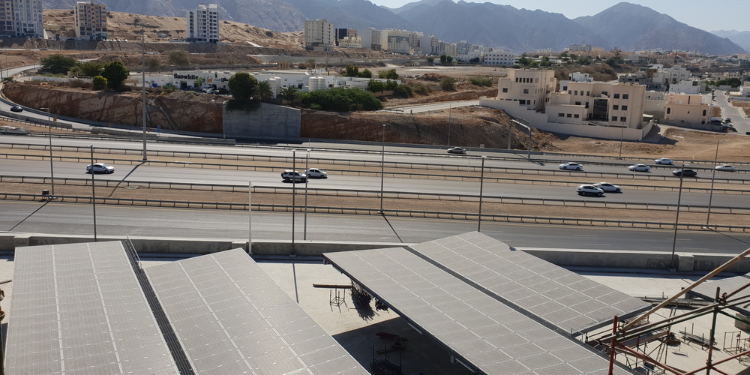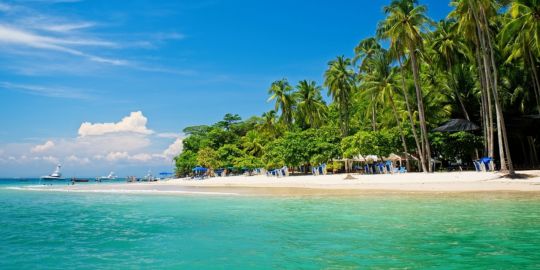Oman, the future giant of green hydrogen
Presented in 2021, the Oman Vision 2040 economic and social development plan includes measures to increase the share of green energy. One such measure is reducing the oil share in GDP to 16% by 2030 and 8.4% by 2040.
Known for its oil and gas production, Oman aims to achieve carbon neutrality by 2050. By the end of 2022, it had already confirmed its "green shift" by reducing its consumption of fossil fuels in favor of renewable energies. On 10 January 2024, the Minister of Finance presented a roadmap aimed at reducing the country's dependence on fossil fuels to attract "green" investors. Oman is showing willingness and says it "appreciates the potential of renewable energies". In 2023, the sultanate announced that it would invest $140 billion in green hydrogen. According to observers, Oman could become the 6th largest global exporter of hydrogen, and the first in Middle East, by 2030.
Presented as "the fuel of the future", "green" hydrogen is obtained from water and renewable energies (hydro-electricity, wind, sun, etc.). Unlike "conventional" hydrogen, green hydrogen is not produced from fossil fuels. Hence its interest for oil-producing countries. In June 2023, Oman launched a megaproject for green hydrogen, entrusted to the French company Engie and the South Korean steelmaker Posco. In December, the sultanate launched "Manah 1", a photovoltaic solar megaproject, again with the cooperation of France and South Korea.
Saudi Arabia
Saudi Arabia is also betting on renewable energy. While Oman has its Vision 2040, Saudi Arabia has its Vision 2030 and just as many challenges to diversify its economy. In 2021, it aspires to carbon neutrality by 2060. In 2022, it has chosen the Public Investment Fund (PIF), the Saudi sovereign wealth fund, to initiate the transformation of the Saudi economy. The PIF intends to allocate over $10 billion to the development of "green projects" by 2026. The fund will finance the majority of Saudi Arabia's "green program."
The world's leading exporter of crude oil wants to show its willingness to move away from being solely dependent on oil. With NEOM Green Hydrogen Company (NGHC), it is venturing into the export of green hydrogen. "Neom" is the name of the futuristic city that aims to revolutionize urban development, accelerate the energy transition (wind turbines, solar panels, etc.), and give nature back its rightful place. The project also symbolizes the economic diversity sought by the Saudi Kingdom.
Saudi Arabia wants to show that it is active on all fronts. With its "Saudi Green Initiative" program, it is highlighting the need for scientific and technological innovation to meet the challenges of the future. The program is based on 3 pillars: development, sustainability and innovation. The Green Initiative aims to plant 450 million trees and rehabilitate 8 million hectares of degraded land by 2030. A billion dollars have already been invested in climate and scientific research and in combating the effects of climate change.
United Arab Emirates (UAE)
Are the Emirates already in the post-oil era? The climate agreement reached at COP28 (December 2023) suggests so. Although the UAE does not call for a complete halt to fossil fuels but rather for a "progressive transition" away from them, international media notes a "historic" change of vision.
In July 2023, the UAE announced a series of measures to diversify its economy. It was also a way to respond to skeptics who questioned the upcoming holding of COP28 in Dubai. Among the measures announced are accelerating the development of electric cars and the production of "green" hydrogen. Green hydrogen production is expected to double by 2030. The UAE also plans to triple its production of green energy by 2030.
To diversify its economy, the UAE is also investing overseas. On the occasion of the first African Climate Summit (September 2023), the UAE announced an investment of 4.5 billion dollars in green energy in Africa. In line with the speech of Kenyan President William Ruto (the host country of the summit), the UAE highlights the potential of the African continent. "If Africa loses, we all lose", summarized Sultan Al Jaber, Minister of Industry and Technology of the UAE.
Investment in green energy also means opportunities for foreign talent
The vast field of ecology (renewable energies, sustainable development, energy transition, green economy) offers a wide range of possibilities for both local and foreign professionals. For expats, the development of partnerships between countries (particularly through their companies) is an additional gateway to employment.
All sectors (primary, secondary and tertiary) are affected by the energy transition. In agriculture, governments are looking for energy-efficient irrigation solutions and other cultivation methods. In industry, the infrastructures for the future are being designed to be more environmentally friendly. The financial and technological challenges of the "green revolution" are being addressed in the tertiary sector.
But the quest for economic diversification encompasses many other parameters and as many possible jobs: energy (geologist, wind farm project manager, engineer, hydraulic engineer, etc.), sustainable development and environment (environmental biologist, nature coordinator, meteorologist, etc.). There are many other 'green' professions, such as waste treatment, sanitation, water production and distribution, decarbonization, quality management, climate lobbyists, etc. Other sectors can become "green" too, more or less directly, such as banking and finance (financing "green" projects), marketing and communication, commerce, etc. All these professions have one thing in common: a high level of expertise. Overall, the concept of green jobs" includes many "jobs of the future" sought by governments.
Diversifying economies but keeping fossil fuels
While Gulf countries express their willingness to move away from "oil dependence", they are not saying they will stop using oil completely. It's more of a "gradual shift" from fossil fuels. COP28 was attended by more than 2,000 fossil fuel lobbyists who believe that ecological transition will take time.
Oman still relies heavily on oil and gas. According to the International Energy Agency (IEA) report published on 12 June 2023: "Oil and gas currently account for about 60% of Oman's export revenues, and domestic natural gas provides over 95% of the country's electricity production". The UAE has announced plans to increase crude oil production by around 3 to 5 million barrels per day by 2027. By venturing into green hydrogen, Saudi Arabia is not aiming to reduce its production but to produce "cleaner" energy. However, opinions are divided about this "miracle hydrogen". According to scientists, it will only become "clean" if it follows a specific protocol.
Other major oil-producing countries (United States, Canada, Russia, Qatar, Iraq, Kuwait, etc.) also continue to rely on fossil fuels while working towards ecological transition. In the EU, French, British, and Italian companies continue to finance fossil fuel megaprojects in Africa. Although the continent accounts for only 2 to 3% of global greenhouse gas emissions, it suffers the most from its effects compared to the most polluting countries.
Although the message is sometimes unclear, governments assert that economic diversification cannot be achieved by abandoning fossil fuels. In 2023, the United States remains the world's largest producer and consumer of oil.
















